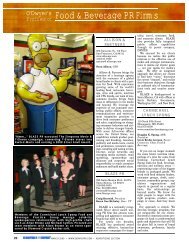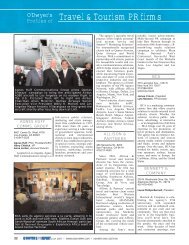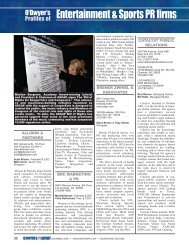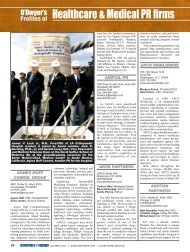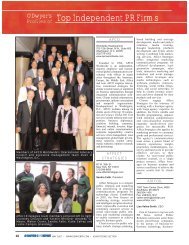May '11 PR Rankings Issue - Odwyerpr.com
May '11 PR Rankings Issue - Odwyerpr.com
May '11 PR Rankings Issue - Odwyerpr.com
Create successful ePaper yourself
Turn your PDF publications into a flip-book with our unique Google optimized e-Paper software.
MEDIA NOTES<br />
FCC’s “non-discrimination” policy gets broadcast feedback<br />
A new mandate intended to stop racial discrimination in<br />
broadcast advertising has some industry pros emitting frequencies<br />
of their own, claiming it limits advertisers’ ability to<br />
engage in standard targeted marketing practices.<br />
By Jon Gingerich<br />
The Federal Communications<br />
Commission in March released a<br />
public notice alerting <strong>com</strong>mercial<br />
radio and television broadcasters to the<br />
<strong>com</strong>mission’s new enforcement policies<br />
regarding discrimination practices in<br />
advertising.<br />
All ad sales contracts from broadcast<br />
stations must now include a nondiscrimination<br />
clause stating stations can’t discriminate<br />
on the basis of race or ethnicity.<br />
Advertisers also can’t use ads for any<br />
discriminatory purpose; if a station<br />
believes an ad is discriminatory in<br />
nature, they must refuse it along with<br />
any ad revenues.<br />
This measure would now make it illegal<br />
for broadcasters to employ the once<strong>com</strong>mon<br />
advertising practice known as<br />
“no urban dictates.” This is where advertisers<br />
and ad agencies intentionally by-<br />
8<br />
MAY 2011 WWW.ODWYER<strong>PR</strong>.COM<br />
pass stations where they feel its audience<br />
falls outside the ad’s target market.<br />
Advertisers could skip over programs<br />
popular in the black or Latino market, if<br />
they felt the average listener/viewer didn’t<br />
fall within the target market for that<br />
product.<br />
The FCC specifically states the new<br />
requirement is “aimed at advertising<br />
contracts that contain ‘no urban/no<br />
Spanish’ dictates.” The policy <strong>com</strong>es in<br />
the form of new provisions to broadcast<br />
license renewals. Commercial broadcasters<br />
must <strong>com</strong>plete a nondiscrimination<br />
certification in order to renew their<br />
licenses.<br />
In a press release, FCC Chairman<br />
Julius Genachowski said the <strong>com</strong>mission<br />
will use the new regulations to<br />
“vigorously enforce its rules against discrimination<br />
in advertising sales contracts.”<br />
“Discrimination simply has no place<br />
in broadcasting,” Genachowski said.<br />
The problem, some say, is that the new<br />
rules do not draw a line between the<br />
blurry boundaries where discrimination<br />
begins and <strong>com</strong>mon practices employed<br />
in standard marketing end. Eric Rhoads,<br />
Publisher and CEO of radio-industry<br />
trade publication Radio Ink and<br />
Streamline Publishing, said for this reason<br />
the FCC’s new policy, while wellintentioned,<br />
is problematic.<br />
All marketing involves a degree of<br />
informational discrimination. Advertisers<br />
know who their prospective customers<br />
are, and target members of the pool most<br />
likely to purchase their product. The<br />
question be<strong>com</strong>es: when does the practice<br />
of picking your market go from a<br />
decision based on good business sense<br />
to one based on bigotry?<br />
“If an advertiser is targeting a certain<br />
market they’re going to advertise in<br />
places they think will bring them clientele,”<br />
Rhoads said. “Let’s say we have a<br />
scenario where market research indicates<br />
to an advertiser that a particular<br />
market is just not a viable audience for<br />
them. I don’t want to promote bigotry,<br />
but as an advertiser you should have a<br />
right to make that selective targeting.”<br />
Moreover, because it is the job of the<br />
broadcasters to refuse any advertisement<br />
they feel is being used in a discriminatory<br />
fashion, Rhoads said the new regulation<br />
unfairly places the regulatory burden<br />
on those who sell the ads. Ad reps<br />
— who are usually under pressure to<br />
make sales quotas — aren’t privy to the<br />
nuances of discrimination law, and thus<br />
can’t be expected to adequately sniff out<br />
offenders.<br />
“What ad rep is going to do that?”<br />
Rhoads asked.<br />
Finally, Rhoads said that while the<br />
FCC claims it will “vigorously enforce”<br />
these new rules, it doesn’t adequately<br />
define when ad targeting is discriminatory<br />
and when it isn’t. Is it discrimination<br />
when a client selling products that<br />
primarily targets African Americans<br />
decides it doesn’t want to broadcast in<br />
say, a rural radio market?<br />
“What if someone is advertising a<br />
product that appeals mainly to a black<br />
audience. Could a predominantly white<br />
radio station now claim these advertisers<br />
are being bigoted?”<br />
“All of this started for legitimate reasons,”<br />
Rhoads continued, “but this is not<br />
something the FCC should be touching.”



